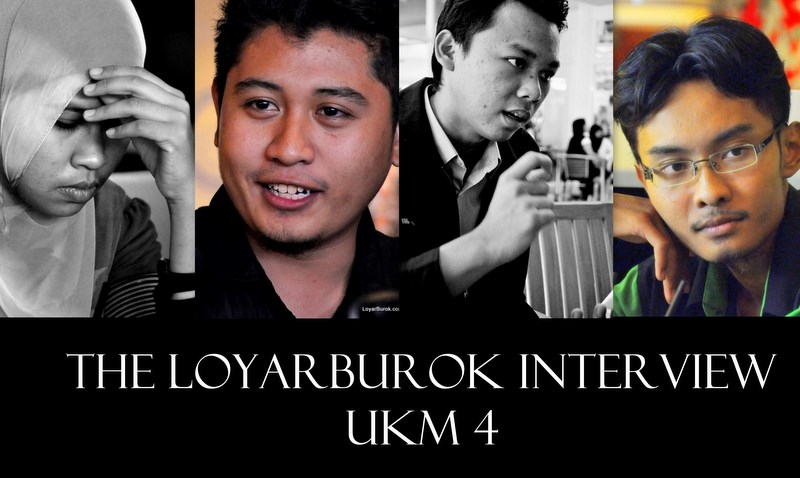
For quite obvious reasons, “Batu 5” as a law student in a local university must write using a pseudonym for fear of the UUCA. Ironically, putting on his debating hat, he tries to justify UUCA’s from the Government’s perspective.
As a student in a local university, I am of course angry at the UUCA imposed by the Government on us, the learning class. Briefly, the all-encompassing nature of the Act is such that if university students wish to organise a dance or a debate, they can only do so after securing the prior consent of their Vice-Chancellor (VC). Students are not allowed to participate in political rallies or even join political parties (section 15 UUCA). The perfect example of students being persecuted would be the UKM4 case.
 My heart goes out to those who are facing trial. Under status quo however, students are allowed to discuss about politics, talk about issues and are free to borak about political parties. This has been clarified by our Deputy Prime Minister and also Minister of Higher Education. In a nutshell, talking about politics is fine, but participating in a political party and at rallies isn’t.
My heart goes out to those who are facing trial. Under status quo however, students are allowed to discuss about politics, talk about issues and are free to borak about political parties. This has been clarified by our Deputy Prime Minister and also Minister of Higher Education. In a nutshell, talking about politics is fine, but participating in a political party and at rallies isn’t.
I’m ticked off because students are presumed dumb and lack maturity when we are the future leaders and we, as human beings have the right to associate as well. I want it abolished. However, it struck me.
What’s the jurisprudential reasoning behind UUCA? I’m sure our gerontocracy, playing a paternal role should have our best interests at heart, yes? After searching the Hansard for a satisfactory answer on the intention of UUCA, (though I laughed at a couple of the MPs’ weird logic), I couldn’t find any which has substance. The usual arguments like how we need to concentrate on our studies cropped up, but it was generic, unconvincing and easily rebutted.
So, I sat down and thought. The “paternal” argument that I managed to conjure, only came when I was forced to support the UUCA in a debating round. I would like to share this argument with you, and I welcome criticisms on my justification for the UUCA.
Let me be clear, this is just a perspective which I think is able to be used to justify the UUCA’s existence, I do not condone the UUCA in any way but condemn it through and through.
As I said above, UUCA only prohibits us joining political parties and rallies unless we obtain the VC’s consent (fat chance in getting that!). Let us analyse two things. First, us, the students and why we are given exclusive treatment (by being barred from politics). Secondly, political parties/rallies and why these are chosen as platforms we are barred from participating.
American History X
First, us, the local university students. We are a young bunch. We are the future leaders of the nation and thus we need to be precariously moulded and shaped to be better individuals in the future. I believe we still are in our formative years. We are gullible, impressionable and easily exploited. We jump on populist things and things like protests and political parties are things filled with excitement. We search for something to identify ourselves with and most probably its political parties.
University students are the ones who are open, receptive to ideas and since we are still learning, are able to read as much as possible. I know it’s a stereotype but I’m guessing a majority of us fall under this category.
Without stereotyping, how does one formulate policies? Think of people who join anarchists, anti-establishmentarian organisations, skinheads or neo-Nazi groups for that matter. Young people mostly, right? Watch American History X, please. And no, my analysis wasn’t based on that movie solely!
What are political parties? Normally, it’s a collection of people who unionise for a certain cause. They hold on to and seek to promote a certain ideology, represent a group’s interest or fight for specific issues. Political parties are strongly partisan [co-operation with other political parties (albeit grudgingly) for a coalition may happen], divisive and have the “us versus them” mentality.
The next pertinent question is what types of people join a political party and who becomes a member? A person who would join a political party would usually be someone who really believes in the party’s cause and support it through and through. I’m not saying the dude is a fanatic, extremist or a hardliner of the party. What I’m saying is that that person has firm convictions on what that party stands for. He made up his mind and made a conscious choice to stand up and be counted for in that party. His support and devotion for the party is unshakeable. Rallies are the same, only those who really believe in the cause of that rally would join. And maybe get a beating by the riot police. Or just tears (from tear gas).
 So what’s the link between students and political parties? Why can’t they be together and the two needs to be divorced?
So what’s the link between students and political parties? Why can’t they be together and the two needs to be divorced?
The first premise that must be established in this argument is that universities should be apolitical and be a bastion of political neutrality. Why?
Since it has been established that students are easily impressionable, their impartiality when making political decisions might be compromised. The tangible harms are, if a student becomes a member of a political party when he is still at his tender years, his views would be skewed only to those of that party’s. This is because you choose to become a member if you really believe in that party.
Furthermore, your views on that party would be more entrenched as you associate with older party members daily, contact them, go to propaganda rallies, and are reminded of the ideology and campaign for the party under its banner. Being a committed member has a lot of work, you know!
As compared to a student who is not a member, though he might have the tendency to support a political party and might be biased to one party during discussions and on issues (status quo allows discussions on issues only, right), his opinion is still subject to change as he is able to hear opinions and arguments from other political parties. His support for that party is not entrenched. He doesn’t associate with members of that party or be brainwashed with its propaganda on a daily basis. He is still impartial.
Marijuana Party
Let’s look at 2 scenarios:
X is a university student. He believes in the Marijuana Party and its policy to legalise marijuana. He doesn’t join the party because he can’t by law. As such, he doesn’t associate with the Marijuana Party members as he is not a member. He cannot attend their gatherings or rallies. His mindset and worldview is still impartial and malleable. He reads the Marijuana Party’s blogs. He also reads the opinions from the Conservative Party which opposes the Marijuana Party’s principles. The Conservative Party’s arguments create reasonable doubt regarding the legalisation of marijuana which the Marijuana Party stands for. X is able to judge both opinions with an open mind and with tolerance as he is not hearing the Marijuana Party’s propaganda every day. His views are still moderate and not yet entrenched.
Z is also a university student. He too believes in the Marijuana Party and its policy to legalise marijuana. He is able to join the Marijuana Party as he could do so by law. He attends their gatherings, rallies, meetings and assemblies. He mixes around with party members, all announcing that they would fight for the cause. Almost everyday, he is exposed to the Marijuana Party’s propaganda. He comes across blogs and opinions from the Conservative Party. Unfortunately, his mind is partial to the Marijuana Party’s ideology and does not want to accept reasoning from the Conservative Party even when their case is strong. He believes the Marijuana Party has the birthright to rule as he believes only in their ideology. Even when the members are corrupt and irresponsible, it doesn’t matter because what the party is fighting for is pure to Z.
As a university student, we are at a tipping point in our lives and this is where the path is forked. If we are imbued and influenced solely with one political party, it is feared that our views would skew to that party. Our impartiality in judging issues would be on what the political party says. It’s hard to turn back.
Of course there would be cases, but it’s the exception rather than the general rule. We shall be entrenched on that ideology only and nothing else.
As a citizen in a democracy, it is essential that we view things with an impartial mind, not tied to an allegiance to a certain political party. We make judgments in a rational manner and being entrenched to a political party would not make us that rational. We need to produce citizens who upon graduation are able to vote with a mind uncontaminated by partisanship.
Let’s look at a boy who is habitually advised and reminded from young to devote himself to a party by his parents. He would always support that party no matter what and have the feeling that even if that party is wrong, he would still support it. Look at people who beat each other up just because they support a different party (especially during election time). These things need to be avoided and the protection of young minds is what UUCA is doing.
Disclaimer
Some might ask, what about non-students who are youths? Well, we can’t regulate them as they aren’t in an institution which we can take action. Plus, the intellectual class are the ones who have a higher tendency to become future leaders.
What about Kelab UMNO Luar Negara? As much as I might despise this, laws operate intra-territorially thus the law does not apply to Kelab UMNO Luar Negara. We don’t own universities outside Malaysia!
This article is primarily about the substance of UUCA, not about those who administer it. So if there are rumours that the BN Government allows BN clubs to operate among students or students are allowed to go to BN meetings, then that’s a failure of the administrators of the law to ensure impartiality.
Remember, the law is only as good as those who administer it.
Batu 5 is a law student and a debater. He considers himself a full time debater and a part time law student. He believes that inter-varsity debating is the best thing in the world. He also is a dreamer as he plans to establish a company which is too big to fail for Malaysia with his girlfriend. He believes that Malaysia is in a class war, and his class, the learning/student class is losing out.

Everyone can get better and informative points I ever seen here keep making great points here with online article writing jobs. Generating more topics always about college students and more educational tips in schools and colleges.